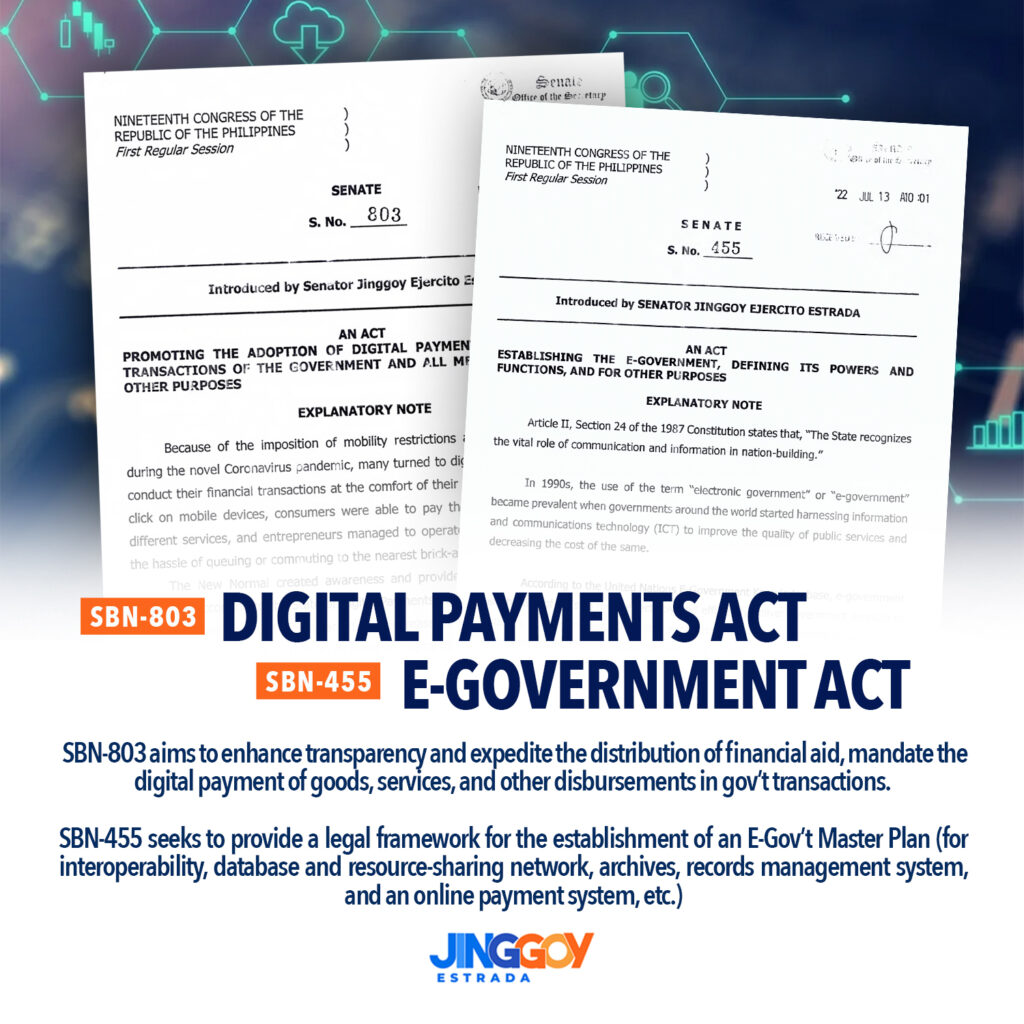WITH the introduction of a hassle-free application program for the certification of overseas Filipino workers (OFW), Senator Jinggoy Ejercito Estrada called for the enactment of measures that will establish full interoperability of all government systems and services to reduce red tape and expedite the digital transformation of the country.
“These bold and innovative steps mark a significant milestone in ensuring the welfare and well-being of our modern-day heroes. By eliminating unnecessary fees in issuing Overseas Employment Certificates (OECs), we’re showing them the respect and appreciation they deserve. I’m hoping we could sustain and build on the digital transformation of government operations and processes to increase efficiency, productivity, and transparency,” Estrada said.
In response to reports on the upcoming hassle-free app of the Department of Migrant Workers (DMW), which will make the OEC free of charge, Estrada is pushing for the development and enhancement of electronic government (e-government) services and processes, including the implementation of an online payment system and business registration-related transactions.
Estrada, as chairperson of the Senate Committee on Labor, Employment, and Human Resources Development, has been advocating for the establishment of an E-Government Master Plan and the institutionalization of a national policy on the adoption of digital payments for government disbursements and collections.
One of the veteran lawmaker’s proposals, Senate Bill No. 803, also known as the “Use of Digital Payments Act,” aims to enhance transparency and expedite the distribution of financial aid to the most vulnerable sectors, especially in times of crisis. It also seeks to mandate the digital payment of goods, services, and other disbursements in government transactions.
Another measure introduced by Estrada, Senate Bill No. 455, or the proposed “E-Government Act,” aims to provide a legal framework for the establishment of an E-Government Master Plan. This includes provisions for interoperability, database and resource-sharing network, archives, records management system, and an online payment system, among others.
“Through a user-friendly app, such as a dedicated app for the issuance of OECs, we can save time and resources for both the government and our OFWs while providing accessible and responsive services to our hardworking OFWs,” Estrada emphasized.
“Marami ng bansa ang nagpapatupad ng iba’t ibang uri ng e-government at nagkaroon na ng digital transformation ng kanilang financial system upang mapaigting ang pagbibigay ng serbisyo sa publiko. Kailangan natin sumabay sa mga pagbabagong ito,” he added.
Full interoperability sa gobyerno, pagtataguyod ng digital payments iginiit ni Jinggoy
NGAYONG malapit na magkaroon ng online application o app kung saan maaaring makakuha na ng libreng employment certificate ang mga overseas contract workers (OFWs), itinutulak ni Senador Jinggoy Ejercito Estrada ang pagsasabatas ng mga hakbang upang maging ganap na ang interoperability ng lahat ng sistema at serbisyo ng gobyerno para mapabilis ang digital transformation sa bansa at mabawasan ang red tape.
“Ang mga ganitong makabagong hakbang na maituturing nating milestone ay mapapangalagaan ang kapakanan ng ating mga itinuturing na bagong bayani. Sa pagsasalibre ng Overseas Employment Certificates (OECs), ipinamamalas natin ang respeto at pagpapahalaga na nararapat sa kanila. Umaasa ako na maipagpapatuloy natin at maitataguyod ang digital transformation para mapabuti, maging mas produktibo at transparent ang mga operasyon at proseso sa gobyerno,” sabi ni Estrada.
Sinabi ito ni Estrada matapos maiulat ang binubuong app ng Department of Migrant Workers (DMW) para sa OEC at gawin itong libre para sa mga OFWs.
Isinusulong ni Estrada ang pagkakaroon ng simple at mabilis na proseso at serbisyo sa pamamagitan ng electronic government (e-government), kabilang ang pagpapatupad ng online na sistema sa pagbabayad at sa mga transaksyon na may kaugnayan sa pagpaparehistro ng negosyo.
Isinusulong ni Estrada, na siyang chairperson ng Senate Committee on Labor, Employment, and Human Resources Development, ang pagtatatag ng E-Government Master Plan pati na ang pagtataguyod ng digital payments bilang pambansang patakaran sa mga transaksyon sa gobyerno.
Kabilang sa mga naihain ng beteranong mambabatas ang “Use of Digital Payments Act” na nakapaloob sa Senate Bill No. 803 at layong pahusayin ang transparency at pabilisin ang pamamahagi ng mga tulong pinansyal sa mga nangangailangan sa panahon ng krisis. Ipinapanukala rin nito ang pagsasabatas ng digital payment scheme para sa mga produkto, serbisyo at iba pang isinasagawang transaksyon ng gobyerno.
Ang isa pang ipinapanukala ni Estrada, ang Senate Bill No. 455 o “E-Government Act,” ay nakatuon sa pagkakaroon ng legal framework para sa pagbalangkas ng E-Government Master Plan. Kabilang dito ang mga probisyon para sa interoperability, database and resource-sharing network, archives, records management system at isang online na sistema sa pagbabayad at iba pa.
“Sa pamamagitan ng isang user-friendly app, tulad ng isang app na nakatuon sa pagbibigay ng OECs, makakatipid tayo ng oras at gastusin sa gobyerno at ng mga OFWs habang nasisiguro ang pagkakaroon ng accessible at agarang serbisyo sa mga OFWs,” diin ni Estrada.
“Marami nang bansa ang nagpapatupad ng iba’t ibang uri ng e-government at nagkaroon na ng digital transformation ng kanilang financial system upang mapaigting ang pagbibigay ng serbisyo sa publiko. Kailangan natin sumabay sa mga pagbabagong ito upang mapakinabangan natin ang benepisyo ng teknolohiya tungo sa pagpapabuti ng serbisyo para sa ating mga mamamayan,” dagdag pa niya.


